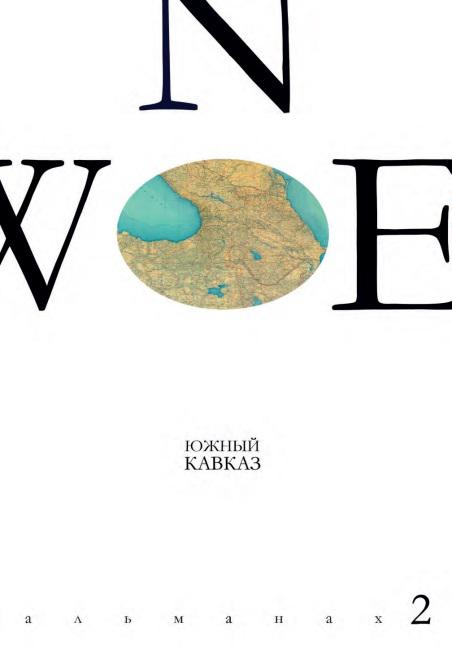Jużnyj Kavkaz Almanac
May 11, 2013 -
Example Author
-
Books and Reviews

Almanach Juznyj Kawkaz.jpg
The Russian Jużnyj Kavkaz (Southern Caucasus) almanac can hardly be counted as an "ideological and cultural magazine". Indeed, it is even questionable whether or not we are actually dealing with a magazine. According to the definition of "almanac" found in the dictionary, it is a publication, usually a periodical, containing the work of various writers. Although the editors have ensured the continuous release of publications, there have only appeared two issues so far: in October 2011 and March 2012. And yet, just by its appearance, the Jużnyj Kawkaz almanac has taken a unique position in the regional periodical press.
To fully appreciate the significance of this project, it is necessary to glance at a map of the region. Next to the three states of Georgia, Azerbaijan and Armenia, you can find three semi-separatist republics, which have enjoyed their de facto independence since a series of wars in the early 1990s. Two of them – Abkhazia and South Ossetia – are on the territory of Georgia, and the third – Nagorno-Karabakh – on the territory of Azerbaijan. Because it is inhabited by Armenians, Azerbaijan considers the government of Armenia as its adversary (both countries do not maintain diplomatic relations with each other). The wars were accompanied by ethnic cleansing, which means that current generations of Abkhazians are entering adulthood without having seen a live Georgian, having no idea about what Armenians look like, knowing their Azerbaijani neighbours only from stories and propaganda. Because it is necessary to know that the image of the enemy in the Southern Caucasus nations is concrete, unambiguous (maybe except for the Georgians who blame their loss of province mostly on Russia).
The idea of the almanac was very easy: gather texts from significant writers, poets and essayists from all countries and semi-states of the region into one place (a means for publishing the magazine were awarded to an international NGO based in London, International Alert). But under the conditions of the Southern Caucasus it was not only a huge logistical challenge, but most of all mental. Communication between Abkhazia, South Ossetia as well as Georgia is very difficult, and between Armenia, Karabakh and Azerbaijan it practically doesn’t exist. Publishing a title next to "enemies" requires courage. Unsurprisingly, the idea was born in Brussels, where the Russian-Georgian war of 2008 gathered representatives of regional NGOs. The fact that the people of the "third sector" managed to convince developers to approve of it, proves that such a project could exist, even if it was through unconscious needs.
In accordance to the nature of the almanac, texts appearing in the journal do not connect specifically to any mottos. Poems, essays and short prose pieces speak primarily about the present and everyday life; about the "here and now" of Georgia, Azerbaijan, Armenia, Abkhazia, South Ossetia and Nagorno-Karabakh, and well-known inhabitants of these places, but constituting terra incognita to their nearest neighbours. The only consciously imposed taboo is conflict. As one of the editors, Guram Odiszaria from Tbilisi points out (recently Georgia's minister of culture; the second editor is Batala Kobachia of Sukhumi): "Literature does not solve all problems, but it helps people understand each other." Because Jużnyj Kawkaz in its entirety is available on the internet, the "enemy image" may begin to erode over time. Of course it is far too early to speak about reconciliation, but the first step is getting to know one another.
An interesting faulty theme is the theme of the city. This could be seen in the first issue containing a cycle of short prose written by Warden Fereszetian devoted to Erywian. The author tries to find a steady middle ground between continuation and change: “Without tradition man’s life dries up, and when tradition prevails, life is petrified.” In the second issue there are two essays by Rachman Badałow about Baku and by Nairy Gelaszwili about Tbilisi. While analysing the role of the capital of Azerbaijan in the construction of national identity, Badałow comes to the conclusion that, contrary to the "democratic rhetoric", the rapid development of Baku secures the "tribal-clan organization of social life". Gelaszwili criticizes contemporary (created under President Mikheil Saakashvili) buildings in the capital of Georgia: "Walk through Chavchavadze’s alley; soon you will not see the mountains anywhere." The city theme will be continued in subsequent editions of the almanac.
Katarzyna Rawska-Górecka
Both current editions of the Jużnyj Kawkaz are available (in Russian) at: http://www.international-alert.org/ourwork/regional/caucasuscentralasia/caucasus (under: “Publications”). The first number includes works by 22 authors, with the second number including 21 authors (as well as photographs by 6 photographers). This includes well known authors previously seen in magazines such as: Selim Babullaogły, Rafik Tagif from Azerbaijan, Gurgen Chandżjan and Lewon Checzojan from Armenia, Dato Turaszwili and Naira Gelaszwili from Georgia, Aleksiej Gogua and Giennadij Alamia from Abchazji, Meliton Kazity from South Ossetia and Robert Esajan of Nagorno-Karabakh.
The review was written within the Free Speech Partnership programme supported by the Visegrad Fund.

































